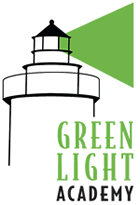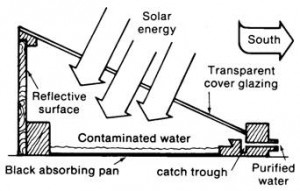July 13th, 2009 by Frank LaBanca, Ed.D.
 As part of the curriculum I developed for Beacon Preservation’s Green Light Academy, students participated in a hands-on, minds-on activity to develop and build a small-scale solar still. In true “guided inquiry” format, we gave the students some minor expository information about concepts of distillation for purifying salt water, and then asked them to design and build their own still using wood splints, plastic wrap, and different adhesives.
As part of the curriculum I developed for Beacon Preservation’s Green Light Academy, students participated in a hands-on, minds-on activity to develop and build a small-scale solar still. In true “guided inquiry” format, we gave the students some minor expository information about concepts of distillation for purifying salt water, and then asked them to design and build their own still using wood splints, plastic wrap, and different adhesives.
I was absolutely amazed how engaged the students were. They were building, asking questions, sketching, thinking, and really working hard. They actually wound up working over an hour longer than we initially had planned. No problems on my end. When you are working with flexible time, and not confined to the “tyranny of the bell,” you can make great learning experiences occur. Best of all, students were being creative, and NOT working under the traditional frameworks often associated with a science lab:
- a clear, defined procedure,
- identifying variables, constants, and controls
- meticulous data collection

from: rael.berkeley.edu
I think science instruction often focuses on logical/analytical processes. However, this was an engineering project – build, develop, deliver. And although there were logical and analytical thoughts, there was more of an emphasis on creativity. There was no one design that would work (the well-conceived (structured) question), but rather an unlimited number of possibilities (the ill-conceived (open-ended) question). Many students were in awe that we, as teachers, did not have a “right” answer in mind.
What has bothered me, however, was the evidence. I think I somewhat dropped the ball, because I didn’t plan well to document student learning. Sure, I anecdotatly perceived student learning of concepts and creativity development, but how did I know it actually occurred? I think it’s so important that we are able to show that students have, in fact, learned. I have been thinking about ways to better document the concept learning and am curious about a good assessment method/mechanism for such a task.